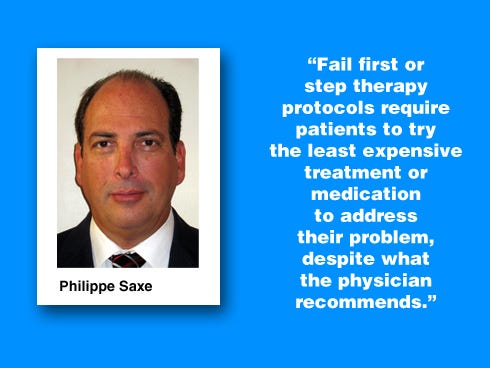
As a rheumatologist who treats patients with chronic and debilitating arthritis, I derive a great deal of satisfaction when the treatment I prescribe helps my patients and improves their quality of life. However, two protocols used by insurance companies to reduce their costs – prior authorization and step therapy—are responsible for placing a heavy burden on medical providers and unnecessarily interfere with a physician's ability to provide effective treatment.
Prior authorization refers to an insurance company policy that requires physicians to obtain the insurer’s approval before they agree to cover the cost of certain treatments and medications. Each different insurer can have dozens of different prior authorization forms doctors must complete depending on the type of insurance coverage the patient has. To meet these requirements, physicians have to complete time consuming phone calls, e-mails, faxes, and input of data which detracts from patient care.
Fail first or step therapy protocols require patients to try the least expensive treatment or medication to address their problem, despite what the physician recommends. Insurance companies require patients to first fail on the least expensive treatment option before receiving the one their physician originally prescribed for them. These protocols may result in a patient's condition deteriorating and being hospitalized.
Prior authorization and fail first protocols are primarily paper-based, and are extremely inefficient. Studies have shown that the prior authorization process is costing the health care system between $23-31 billion per year, which equates to about $85,000 per physician. These costs are ultimately passed on to consumers in the form of higher insurance premiums or out-of-pocket expenses. The insurance companies utilize fail first and prior authorization protocols to save costs by delaying or denying treatment. As a result, a patient's treatment may be unnecessarily delayed, or denied altogether.
Florida HB 1001 sponsored by Representative Brodeur reduces medical red tape by creating short, standardized, electronically available, prior authorization forms for medical procedures and prescription drugs, that all insurance carriers will be required to accept. Additionally, insurance companies will be required to act on the request for prior authorization within 72 hours or the drug/procedure is deemed automatically approved. This bill also puts the physician in charge of fail first protocols by allowing the physician to override fail first restrictions if the physician deems the treatment to be ineffective. In addition, this bill requires insurance companies to maintain an accurate and updated list of providers on their website so that patients can make informed decisions as to which health insurance product to purchase.
Although chronic diseases such as rheumatoid arthritis and osteoporosis cannot be cured, the specialized medical care from their rheumatologist can ease pain and improve the quality of life of our patients. It is time to reform existing prior authorization and first fail protocols which are burdensome, expensive, and inefficient. Legislators must ensure our patients receive the necessary care recommended by their physicians in a timely fashion so they no longer needlessly suffer.
Philippe A Saxe M.D. is managing partner at Arthritis Associates of South Florida in Delray Beach, immediate past president of the Florida Society of Rheumatology and serves on the executive committee of the Coalition of State Rheumatology Organizations.
This article originally appeared on Crestview News Bulletin: COMMENTARY: Better medical care, less hassle
